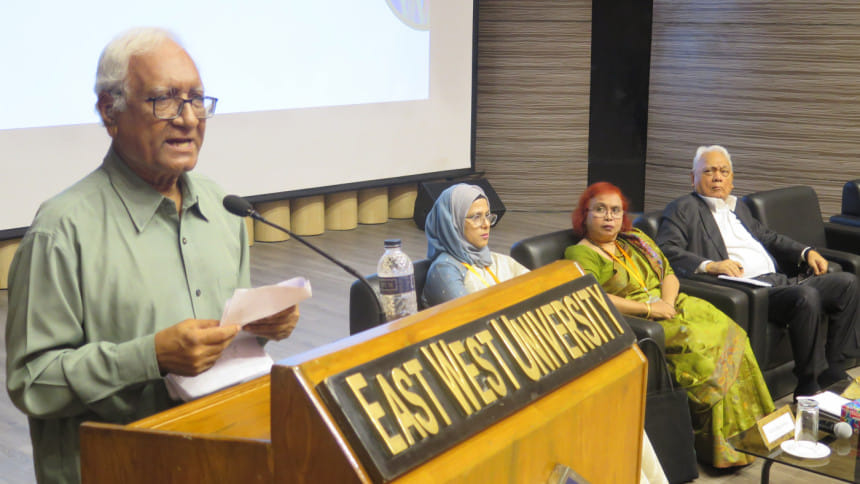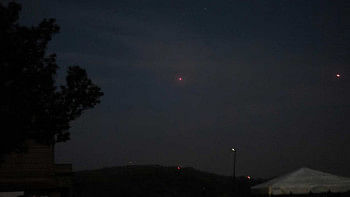“Teaching Literature and Interdisciplinarity”: int’l conference at EWU explores the importance of language and literature

English is inherently a subject with interdisciplinarity and variety. In an exploration of this very idea, on July 28, the Association of Teachers of Literatures in English, Bangladesh (ATLEB) and East West University (EWU) inaugurated the two-day international conference titled "Teaching Literature and Interdisciplinarity".
The conference, as a whole, was sprawling with ideas and conversations regarding literature, how we perceive it, and how we internalise it, along with the many ways an interdisciplinary look at literature has become imperative in today's climate. In fact, one of the key points highlighted in the inauguration ceremony was how interdisciplinarity breaks down boundaries and provides a strong foundation for the future of education and knowledge, where collaboration is important.
Serajul Islam Chowdhury, Professor Emeritus at Dhaka University, attended the conference as the Chief Guest and took the stage to speak about the inherent interdisciplinarity present within the world of Literature.
"Literature connects us to the greatest creative minds, to nature, to the environment, all in an effort to become better persons. It is more than a piece of aesthetic curiosity. Literary pieces are rich with historical or ideological contexts." He then went on to highlight the duty literature serves in modern society, "The hope lies in the creation and reading of literature, to uphold the humanities. To drive capitalism away and replace it with social ownership."
Syed Manzur Elahi, Chairperson, Board of Trustees, EWU; Prof. Tahmina Ahmed, Convener, ATLEB and Convener of conference; Dr Abu Shahid Abdullah, Co-Convener of the conference. and Dr Farzana Akhter, Dean, Faculty of Liberal Arts and Social Sciences, EWU, all made their appearances in the ceremony along short and impactful speeches that explored the core of studying literature.
In one of the keynote Speeches, Dr Claire Chambers, a Professor at the University of York, spoke of the importance of literature as a way to break borders – both in academia and in cultures. The idea of transnationalism was brought up as a way through which authors managed to cross cultural borders, citing Tahmima Anam as a writer who has gained fame in India despite her Bangladeshi roots.
Later, Dr Chambers went on to speak about the importance of breaking down borders without relying on colonial roots.
"I think what we should be aiming for is bypassing the West altogether sometimes. I've been really amazed to see several cases of translation occur from Arabic directly to Mandarin and the audience that it has."
She further added, "I've given three talks in my time here (in Bangladesh) so far, and I was challenged to have my mind opened with the conversations we've had. This conference is perhaps the pinnacle, and I'm amazed by the speakers we've gotten to listen to so far."
When speaking of interdisciplinarity, lots of ideas come up. Indeed, the very concept of interdisciplinarity is purposefully vague to allow scholars and researchers to glean their own meaning out of it. However, on this note, the Keynote Speaker on the second day of the event, Dr Rajeev S. Patke, Director of the Division of Humanities at Yale-NUS College, shared his thoughts on interdisciplinarity and the vague nature surrounding it.
"It is difficult to practise interdisciplinarity, and even more difficult to do it successfully. In order to practise any form of interdisciplinarity, one must first develop in a single field well, and then they can expand their horizons. But not because of the sake of being interdisciplinary, but because the nature of their exploration requires it. Most areas of study require a lot of time, so where does one find the time to acquire interdisciplinarity? The danger of falling between two stools is quite considerable."
The keynote speeches of both days were followed by a series of paper and poster presentations. The topics of the papers were as vast and deep as the very idea of literature itself, ranging from analysis of poetry to pop culture sitcoms to artificial intelligence. The presentations make it quite clear that literature and literary analysis are embedded all around us, and are even important in other fields of study. As such, the pursuit of knowledge in the world of literature is ever-expanding, and platforms provided to scholars and researchers only allow for the envelope to be pushed further to discover something new about the very nature of humanity.
Raian is a contributing writer at Campus.

 For all latest news, follow The Daily Star's Google News channel.
For all latest news, follow The Daily Star's Google News channel. 



Comments